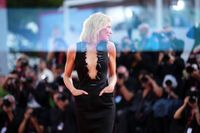The 82nd Venice Film Festival wrapped up on Saturday, September 6, 2025, with a swirl of cinematic triumphs, emotional moments, and a touch of controversy that had the Lido buzzing well after the final curtain fell. The coveted Golden Lion—the festival’s top honor—went to Jim Jarmusch’s understated and gently humorous film, Father Mother Sister Brother, in what many called an unexpected twist over some of the festival’s more high-profile and politically charged entries.
Jarmusch’s film, starring Adam Driver, Vicky Krieps, and Cate Blanchett, explores the tangled relationships between adult children and their parents. The movie’s charm lies in its subtlety and wit, a quality that resonated with the jury led by director Alexander Payne. Despite receiving a relatively modest six-minute standing ovation (a far cry from the marathon applause sessions that have become a Venice tradition), the film ultimately captured the festival’s highest prize. “All of us here who make films are not motivated by competition,” Jarmusch said during his acceptance speech, according to AP. “But I truly appreciate this unexpected honor.” He went on to thank the festival for “appreciating our quiet film.”
Yet, it was Kaouther Ben Hania’s The Voice of Hind Rajab that stole much of the emotional spotlight. The docudrama, which tells the harrowing true story of a six-year-old girl’s desperate call for help during the January 2024 conflict in Gaza City, left audiences in tears and garnered a staggering 23-minute standing ovation after its premiere. The film uses real audio from Hind’s call to the Palestine Red Crescent Society, with actors portraying the emergency responders on the other end of the line. According to The Guardian, the auditorium was filled with sobs, and many believed the film was destined to take home the Golden Lion, predicting it could serve as a tipping point for international political opinion on the Gaza conflict.
Instead, The Voice of Hind Rajab received the Silver Lion, the festival’s runner-up prize. The jury’s decision sparked online outrage and accusations of a “blandly pro-American copout,” as some critics put it. The debate even spilled into the festival’s post-awards press conference, where Payne was asked about rumors that jury member Fernanda Torres had threatened to quit over the snub. Payne’s response was characteristically wry: “One of my jurors threatened to quit? … I did … no. Did someone threaten to quit? I think we know … not to believe everything we read online.” Still, the controversy underscored the high stakes and passionate opinions swirling around this year’s selections.
Ben Hania herself took the stage to address the situation in Gaza, delivering a heartfelt plea for peace. “Enough is enough,” she declared, calling for an end to what she described as “this unbearable situation.” Her words, coupled with the film’s raw emotional power, left a mark on audiences and critics alike. As AP noted, the film’s impact was immediate and profound, with many predicting it would be remembered long after the festival’s other winners had faded from memory.
The festival was not without its share of glitz and glamour, either. The red carpets were awash with high fashion, as stars like Cate Blanchett (in both Maison Margiela feathers and a classic black Armani gown), Greta Lee in custom Christian Dior, and Emily Blunt in a crystal-encrusted Tamara Ralph gown made headlines for their sartorial choices. According to Getty Images coverage, Amanda Seyfried, Julia Roberts, Emma Stone, Heidi Klum, George Clooney, and Dwayne Johnson were just a few of the celebrities who brought their signature style to the Lido. The blend of cinematic artistry and fashion spectacle was on full display, reminding everyone that Venice is as much about the scene as it is about the screen.
Other major awards reflected the festival’s eclectic tastes. Benny Safdie took home the Silver Lion for best director for The Smashing Machine, a gritty drama about MMA fighter Mark Kerr starring Dwayne Johnson. The film’s 15-minute standing ovation was impressive, but not enough to sway the jury for the top prize. Paolo Sorrentino’s La Grazia earned Toni Servillo the best actor award for his portrayal of an elegant, fictional Italian president—another nod to the festival’s appreciation for character-driven narratives. Meanwhile, Xin Zhilei was named best actress for her role in Cai Shangjun’s The Sun Rises on Us All, a performance that, while not accompanied by an epic ovation, was universally praised by critics and jurors alike.
The Orizzonti section, which spotlights innovative and emerging voices in world cinema, saw Anuparna Roy win best director for Songs of the Forgotten Trees. The diversity of winners highlighted Venice’s ongoing commitment to celebrating both established auteurs and up-and-coming talent.
Still, the conversation on the Lido often circled back to the political and ethical questions raised by The Voice of Hind Rajab. Some festival-goers and online commentators argued that the jury missed an opportunity to make a powerful statement by awarding it the Golden Lion. Others, including seasoned critics, reminded everyone that film awards are, by their nature, a blend of compromise, taste, and timing. As The Guardian observed, “every jury decision is a copout. All juries are horse-trading and compromising and collectively accepting second-choice movies that no one objects to from film-makers whose prestige they all endorse.”
Beyond the awards and applause, the festival was a showcase for global cinema’s ability to provoke, entertain, and challenge. The presence of films like Park Chan-wook’s No Other Choice (which left empty-handed despite critical acclaim) and Kathryn Bigelow’s A House of Dynamite (noted for its anti-nuclear message and energetic style) sparked conversations about what kinds of stories resonate most in today’s world—and what risks juries are willing to take.
In the end, the 2025 Venice Film Festival was a microcosm of the film world itself: a place where artistry, activism, glamour, and controversy collide. Whether audiences remember this year for Jarmusch’s quiet family drama or Ben Hania’s searing political docudrama, one thing is certain—the conversations ignited on the Lido will echo far beyond the canals of Venice.


